The Icelandic Research Centre for Innovation and Economic Growth co-operates with the Icelandic AB publishing house (Almenna bokafelagid) on works on politics and economics which should be both readable and well-researched:
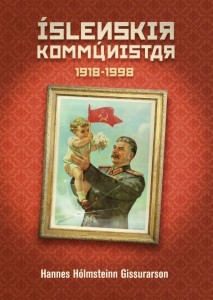 Icelandic Communists, 1918–1998
Icelandic Communists, 1918–1998
This is a 624 pp. account of the Icelandic communist movement, from the autumn of 1918 when the young student Brynjolfur Bjarnason (later the first and only chairman of the Communist Party) participated in a street riot in Copenhagen, to the autumn of 1998 when Margret Frimannsdottir, Svavar Gestsson and other leading members of the People’s Alliance accepted an invitation from the Cuban Communist Party to visit. While the Communist Party abandoned its original name already in 1938, there was a strong link from the first Icelandic communists to some of the last members of the People’s Alliance. The communist movement gained more influence in Iceland than in most other Western democracies and accepted both financial support and political advice from the rulers of the communist states in Europe. The author is Professor of Politics at the University of Iceland.
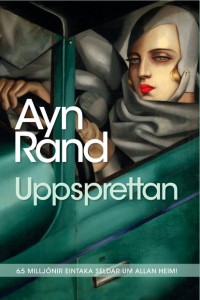 The Fountainhead
The Fountainhead
by Ayn Rand
This best-selling novel by the Russian-born American authoress Ayn Rand, first published in 1943, is about a young architect, Howard Roark, who is a free spirit, and neither a slave to the oligarchs nor the masses. A mysterious beauty, a cynical press lord, a failed social climber and a manipulative intellectual all are part of the ingenious plot. In her works, Rand draws attention to the crucial role of innovators and creators in a free society. This novel is about the man against the masses. The Icelandic edition was first published in 1990, and considerably revised. Translated by philosopher Thorsteinn Siglaugsson.
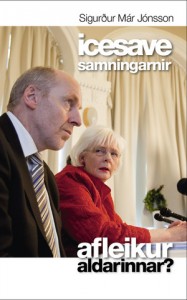 The Icesave Deals: The Blunder of the Century?
The Icesave Deals: The Blunder of the Century?
by Sigurdur Mar Jonsson
An experienced and savvy journalist, Sigurdur Mar Jonsson, looks behind the scene in the dispute between the Icelandic government and the British and the Dutch about who should bear the losses of a failed Icelandic bank with branches in England and the Netherlands. The inexperienced Icelandic negotiators, especially Svavar Gestsson, former leader of the People’s Alliance, were outwitted at every turn by their foreign counterparts. The outcome of the negotiations, however, was vital to the Icelandic people who voted twice against the so-called Icesave deals, refusing to bail out the bankers.
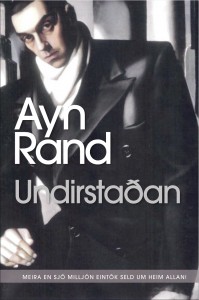 Atlas Shrugged
Atlas Shrugged
by Ayn Rand
The question posed in Ayn Rand’s most popular novel is: What happens if all the creative people in a society go on strike? What is the difference between productive persons and political parasites? Who is John Galt? Rand’s novel is also a steaming love story, with Dagny Taggart, an independent and courageous railroad manageress, dealing with Francisco d’Anconia, her childhood friend and an Argentine copper mines heir, Hank Rearden, a married self-made steel magnate, and the mysterious John Galt, with a lot of other colourful characters participating in the slowly unfolding drama, such as the pirate Ragnar Danneskjold, the conscious counterpart to the mythical Robin Hood. Translated by Elin Gudmundsdottir.
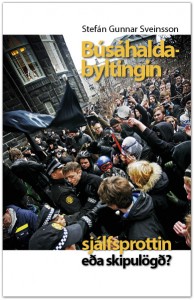 The Pots-and-Pans Revolution: Spontaneous or Organised?
The Pots-and-Pans Revolution: Spontaneous or Organised?
by Stefan Gunnar Sveinsson
The 2008–2009 “Pots-and-Pans Revolution” was indeed a truly extraordinary chapter in Iceland’s history. This previously peaceful society, not even with a military force, suddenly seemed to collapse. Government House, the Central Bank building and Parliament House were under siege, government ministers had to use bodyguards, an attempt was made to wrest prisoners by force from the hands of the police, there were fights of life or death in Reykjavik streets, many policemen were reaching their endurance limits, a government was thrown out of office. Historian Stefan Gunnar Sveinsson has had access to unpublished confidential material, including police reports and personal recollections, and he has interviewed several participants in these memorable events, policemen, protesters, government ministers and members of parliament.
 Income Distribution and Taxes
Income Distribution and Taxes
by Ragnar Arnason and Others
This is a collection of papers by six Icelandic scholars on a topic hotly debated in Iceland. Professor Ragnar Arnason argues that the Gini coefficient is not an adequate measurement of income distribution, that disposable income is more important than nominal income and that there is a meaningful difference between the real and nominal tax burden. Dr. Birgir Thor Runolfsson points out that the freer the economy is, the more poverty is usually reduced. According to him, wealth creation contributes much more to human wellbeing than income redistribution. Professor Hannes H. Gissurarson describes welfare in Iceland in 1991–2004 and responds to criticisms of the “neo-liberal” policies then followed. Economists Axel Hall and Arnaldur S. Kristjansson discuss tax traps and other peculiarities of income transfer mechanisms. Dr. Helgi Tomasson exposes statistical pitfalls in the debate on income distribution.
 We the Living
We the Living
by Ayn Rand
In 1949, We the Living by Rand was serialised in Morgunbladid, the leading Icelandic newspaper. The translator is unknown. The translation has been carefully revised by radio host Frosti Logason and edited by Professor Hannes H. Gissurarson. The most autobiographical of Rand’s novels, its hero is a young and independent Russian woman, Kira Argounova, growing up in St. Petersburg in the 1920s, under the oppressive Bolshevik rule. She is torn between the handsome and charming, but irresponsible Leo, son of a Tsarist admiral, and the honest and earnest young communist Andrei. Fast-paced, romantic and tragic, it is full of persons of flesh and blood rather than simply eloquent preachers. In a postscript, philosopher and lawyer Asgeir Johannesson writes about the life and works of Ayn Rand.
Forthcoming:
Matt Ridley’s best-selling Rational Optimist has been translated into Icelandic and awaits publication: he demonstrates the immense potential of the division of labour and free trade.
Snorri G. Bergsson, a prolific historian, is preparing a multi-volume study of the history of the Icelandic Communist Party.
Professor Hannes H. Gissurarson is directing a research project about the environment, focusing on how it can be protected by defining property rights to natural resources.
Professor Hannes H. Gissurarson is directing a research project on foreign factors in the 2008 Icelandic bank collapse, including the imposition of the British anti-terrorism law against Iceland, a country without a military force.
 RNH also supports and promotes several books published by Ugla, including Stasiland by Anna Funder, about the police state the East German communists imposed on their subjects. Ms. Funder spoke about her book at the international conference which RNH organised 22 September 2012. RNH also promotes books sold with a heavy discount by the online magazine Andriki, such as Icelandic translations of libertarian classics like Locke’s Second Treatise, Mill’s Essay on Liberty and Spooner’s Vices Are No Crimes. On sale at Andriki are also Icelandic translations of The Mystery of Capital by Hernando de Soto, The Ascent of Money by Niall Ferguson, Communism by Richard Pipes, Economics in One Lesson by Henry Hazlitt and many other interesting books. RNH aims at making the Icelandic translation of the Black Book of Communism, translated by Hannes H. Gissurarson and published in 2009, available online 9 November 2014, on the 25th anniversary of the fall of the Berlin Wall, marking the beginning of the end of communism. The book’s editor, Stéphane Courtois, spoke at the RNH international conference 22 September 2012. RNH also supports the project of making interesting books published in Iceland in the Cold War available again online, such as Service, Slavery, Escape by Aatami Kuortti, The God That Failed by Arthur Koestler, Ignazio Silone, Andre Gide and others, Out of the Night by Jan Valtin (Richard Krebs), Darkness at Noon by Arthur Koestler, I chose Freedom by Victor Kravchenko, El campesino by Valentin Gonzalez, Baltic Eclipse by Ants Oras, Estonia: Small Nation Under Foreign Yoke by Anders Küng and Under Two Dictators by Margarete Buber-Neumann.
RNH also supports and promotes several books published by Ugla, including Stasiland by Anna Funder, about the police state the East German communists imposed on their subjects. Ms. Funder spoke about her book at the international conference which RNH organised 22 September 2012. RNH also promotes books sold with a heavy discount by the online magazine Andriki, such as Icelandic translations of libertarian classics like Locke’s Second Treatise, Mill’s Essay on Liberty and Spooner’s Vices Are No Crimes. On sale at Andriki are also Icelandic translations of The Mystery of Capital by Hernando de Soto, The Ascent of Money by Niall Ferguson, Communism by Richard Pipes, Economics in One Lesson by Henry Hazlitt and many other interesting books. RNH aims at making the Icelandic translation of the Black Book of Communism, translated by Hannes H. Gissurarson and published in 2009, available online 9 November 2014, on the 25th anniversary of the fall of the Berlin Wall, marking the beginning of the end of communism. The book’s editor, Stéphane Courtois, spoke at the RNH international conference 22 September 2012. RNH also supports the project of making interesting books published in Iceland in the Cold War available again online, such as Service, Slavery, Escape by Aatami Kuortti, The God That Failed by Arthur Koestler, Ignazio Silone, Andre Gide and others, Out of the Night by Jan Valtin (Richard Krebs), Darkness at Noon by Arthur Koestler, I chose Freedom by Victor Kravchenko, El campesino by Valentin Gonzalez, Baltic Eclipse by Ants Oras, Estonia: Small Nation Under Foreign Yoke by Anders Küng and Under Two Dictators by Margarete Buber-Neumann.


